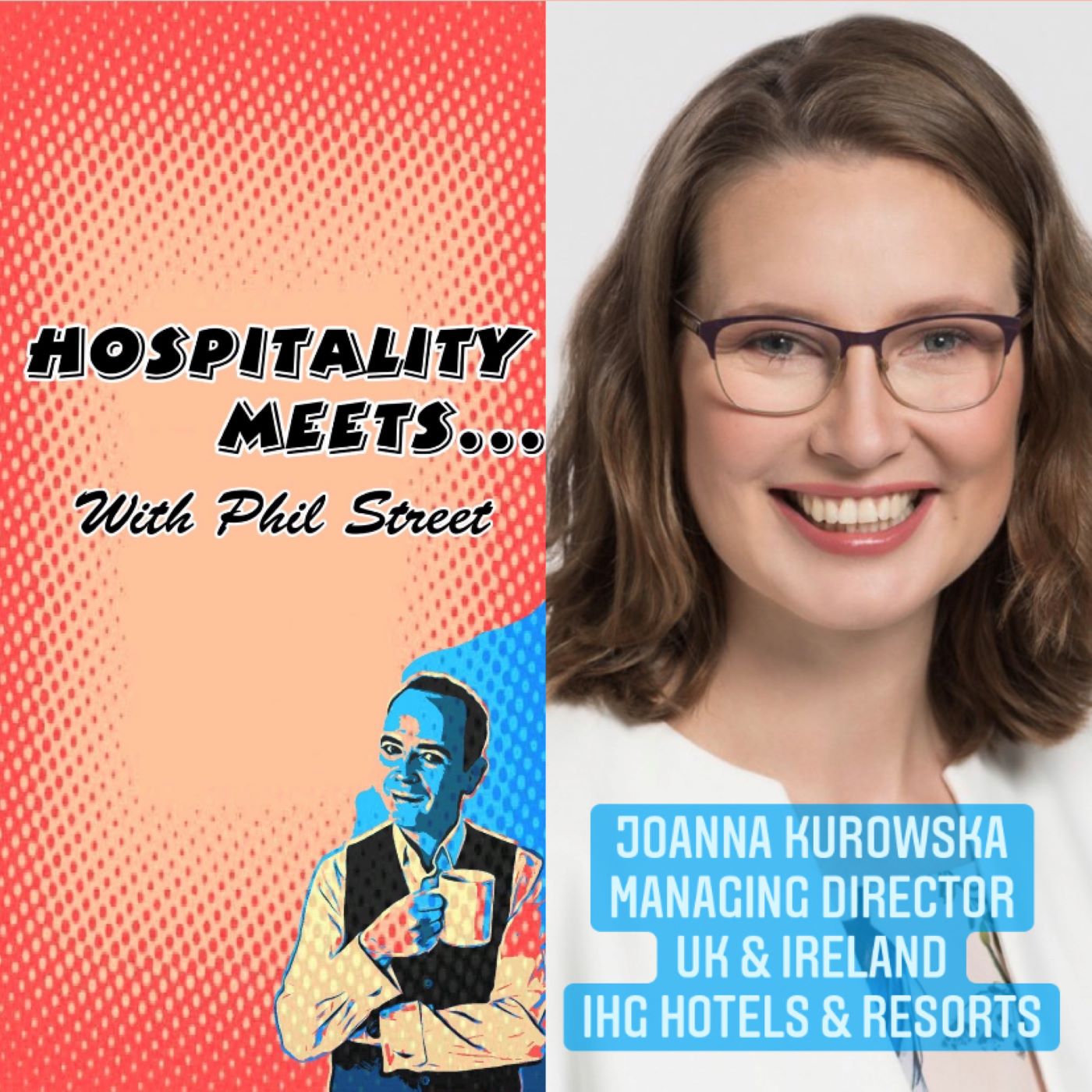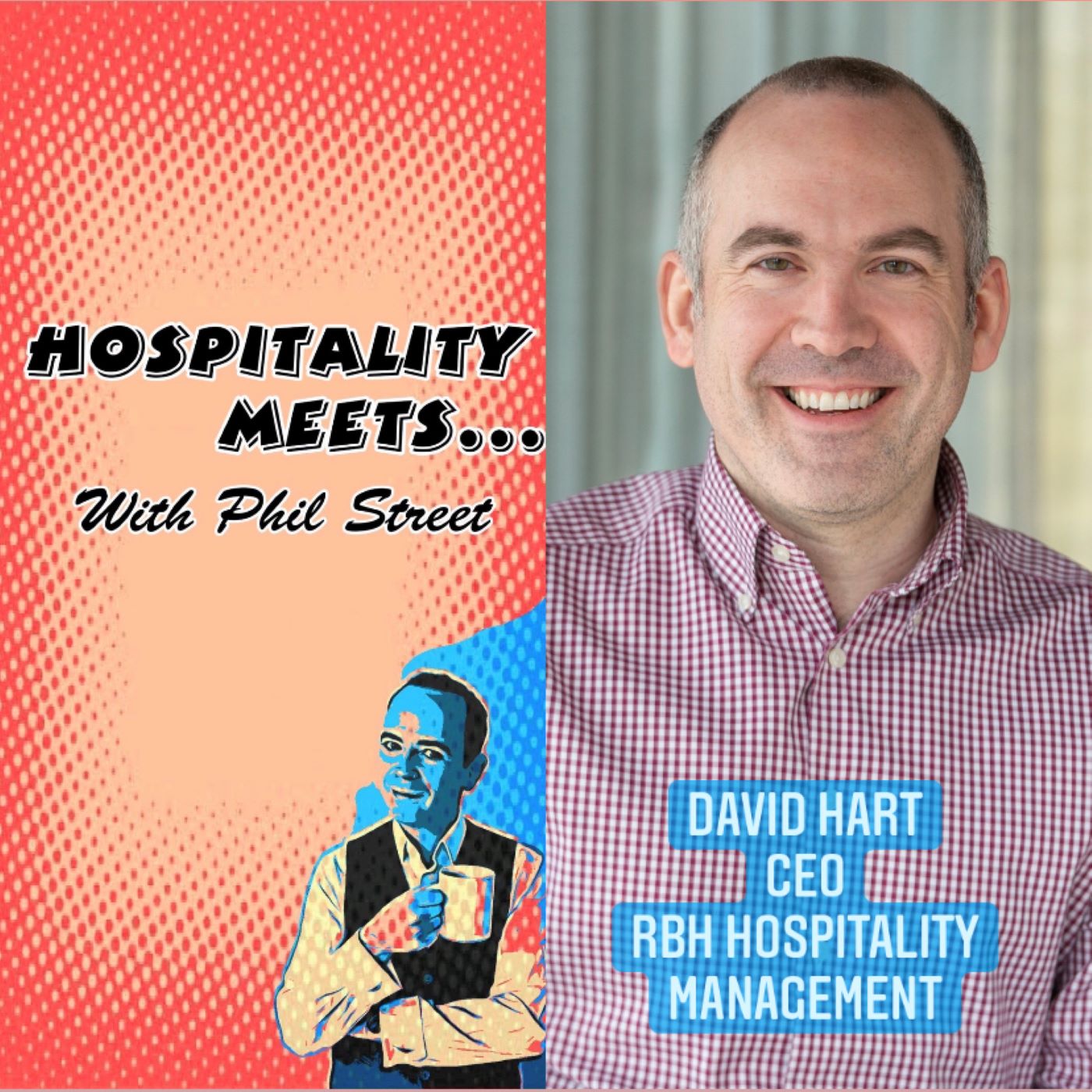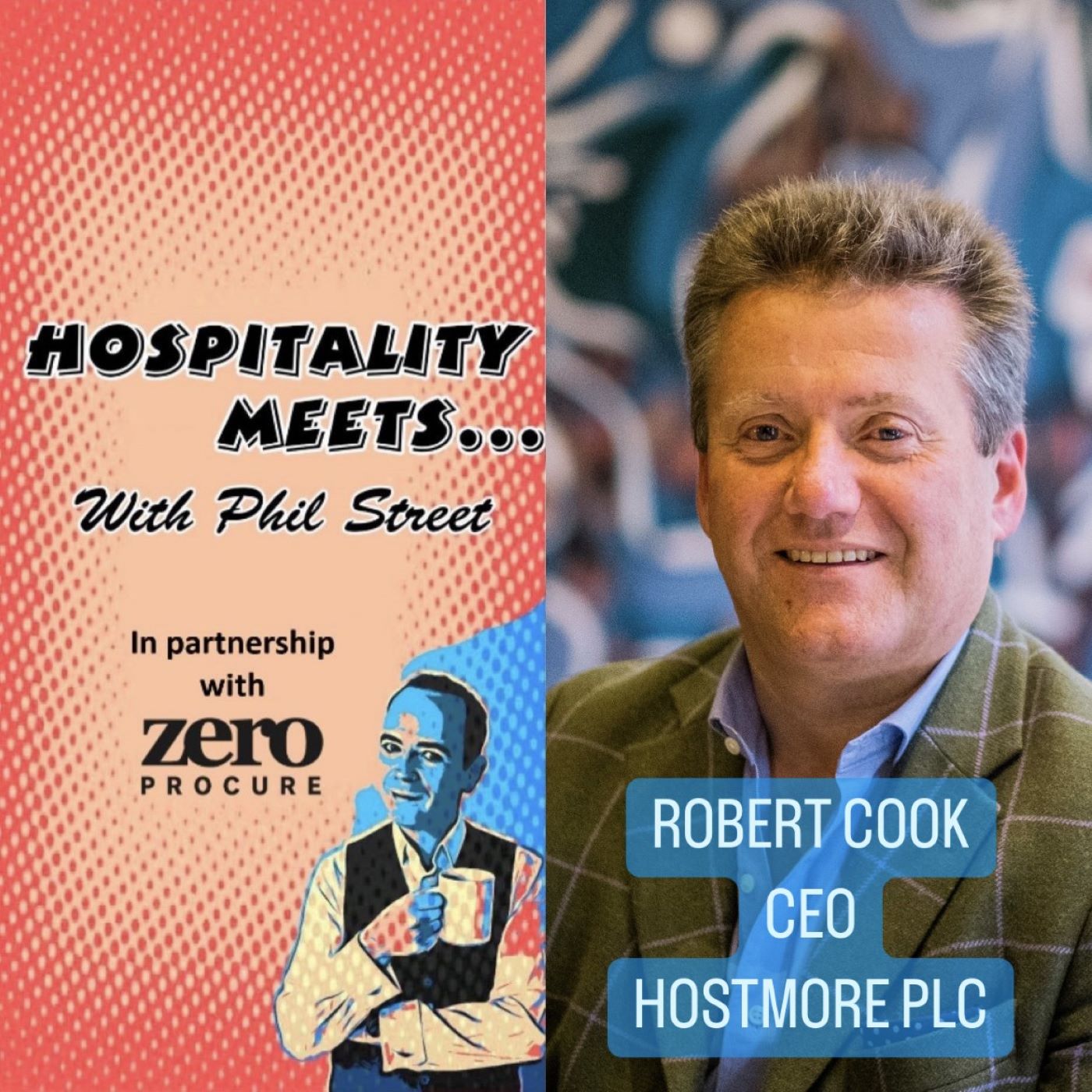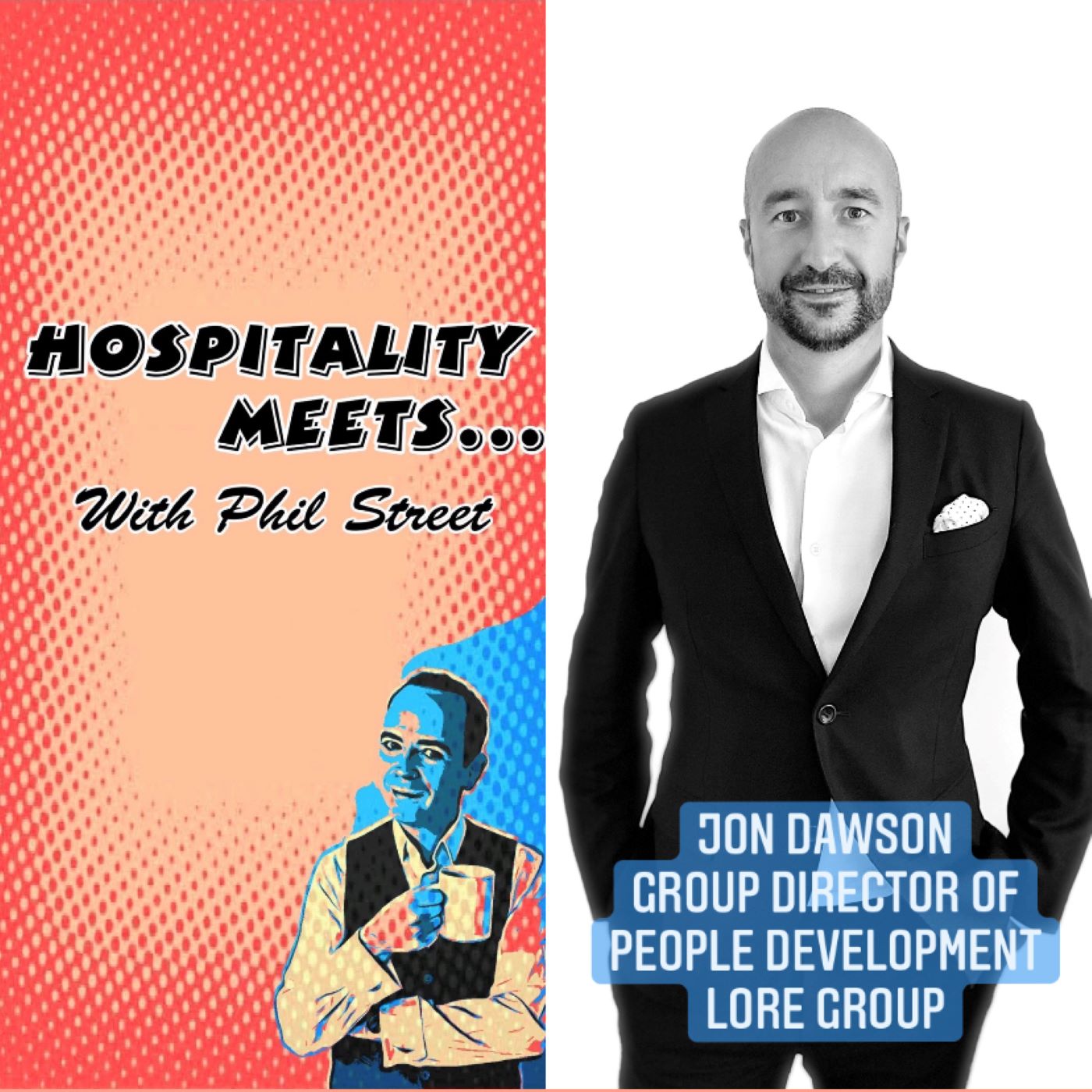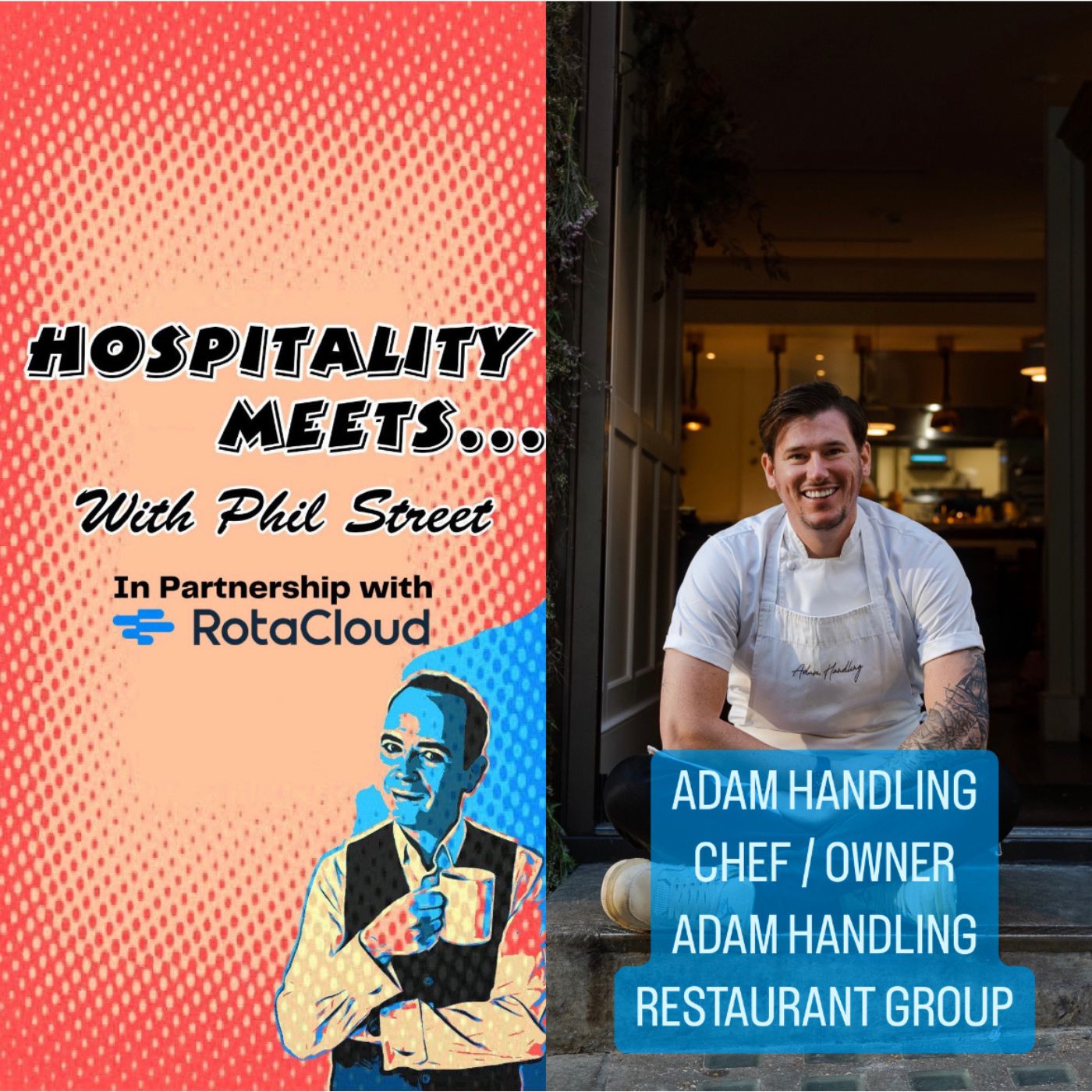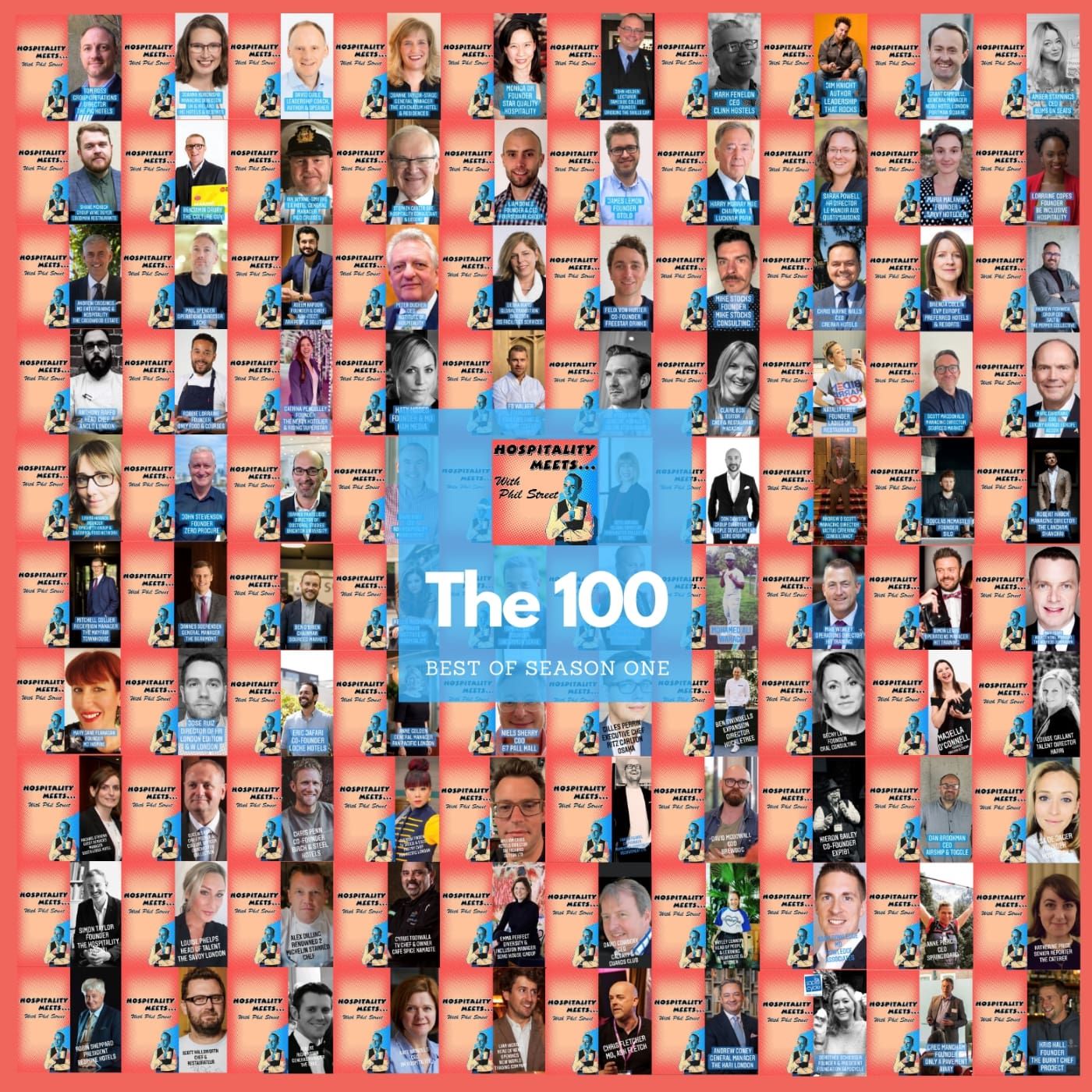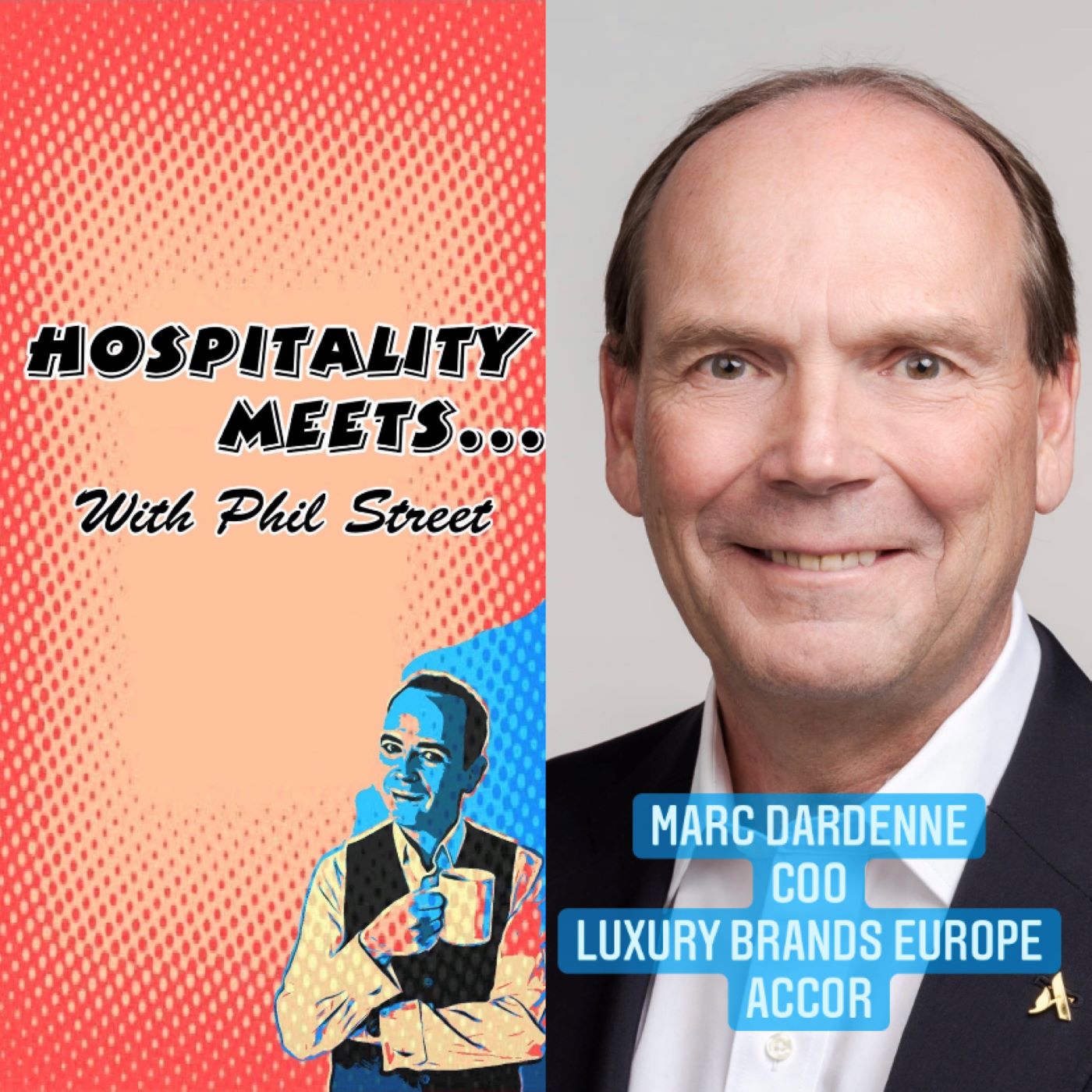Bonus Episode #26 - Hospitality Meets Jason E. Brooks - Every Leader Needs Followers

Today's special episode features an engaging conversation with the quite wonderful Jason E. Brooks, a seasoned expert in the restaurant industry and the author of the transformative book "Every Leader Needs Followers."
Phil, delves into Jason's innovative strategies for integrating new hires, his methodology for effective leadership, and the crucial shift from managing to leading a team. Jason sheds light on his book’s five keys, encapsulated in the acronym MODEL, and further expands on the importance of mastering meetings and bridging the gap between employee and customer perspectives.
Join us as we explore the fundamentals of creating a MODEL mindset for leadership, the power of influence, and the need for continuous training and self-reflection, especially in the challenging times in the aftermath of the pandemic.
Whether you are in the hospitality industry or any other field, this episode offers valuable insights into building sustainable leadership, prioritising employee well-being, and fostering a culture of trust and collaboration. Sit back and tune in for a thought-provoking discussion that promises to leave a lasting impact on your approach to leadership!
The Guest
Jason E. Brooks is a speaker, coach, author, and founder of HospiVation, LLC. Jason creates content that helps impact hospitality leaders on their journeys to help others around them fulfill their calling. His first book, Every Leader Needs Followers: 10 Keys to Transform Restaurant Managers to Hospitality Leaders, launched in March 2024. Jason is a professional speaker and coach speaking on leadership mindsets and techniques in the hospitality industry.
Website - https://www.jasonebrooks.com/
The Book - https://www.amazon.com/Every-Leader-Needs-Followers-Hospitality/dp/B0CTH24WJF
X - @2LeadNSucceed
LinkedIn - https://www.linkedin.com/in/jason-e-brooks/
The Sponsor
Today’s episode comes to you in partnership with RotaCloud, the people management platform for shift-based teams.
RotaCloud lets managers create and share rotas, record attendance, and manage annual leave in minutes — all from a single, web-based app.
It makes work simple for your team, too, allowing them to check their rotas, request holiday, and even pick up extra shifts straight from their phones.
Try RotaCloud’s time-saving tools today by heading to https://rotacloud.com/phil
This podcast uses the following third-party services for analysis:
Podcorn - https://podcorn.com/privacy
Phil [00:00:00]:
And hello, and welcome to a special episode of Hospitality. Meets with me, your host, Phil street. Special, because actually we're going to do something a little bit different today, and I have invited a wonderful chap who's based on the other side of the pond, a man called Jason E. Brooks, who's written a book that I can see right behind him over there called every leader needs followers. So I thought, well, actually, he thought, because he reached out to me, that it might be a good subject for a chat. So welcome to the show, Jason.
Jason [00:00:27]:
Phil, thank you so much. And thank you for replying to my reach out. You know, your show, it definitely reaches well into the US. And I know you could have had a number of people on your show and you chose to say yes, so thank you.
Phil [00:00:44]:
Fantastic. I'm happy to leave it there, to be honest, to hear that it's reaching into the US is. I mean, I can see it from my own data that we're getting there, but. But for sure to hear it from the horse's mouth, as it were. Yeah. Thank you very much. That's a new high.
Jason [00:01:00]:
It only gets better from here.
Phil [00:01:01]:
Only. Yeah. I'm all for reciprocal back scratching. Let's do it. So, yes, you've written a book. Maybe just give us your little kind of elevator pitch on what the book is and why, and then we'll get into your journey. Because I'm really interested to understand how you've arrived at the kind of this knowledge bank that you needed to share with the world.
Jason [00:01:20]:
Well, first, the book is titled every leader needs followers. And it is ten keys to transform restaurant managers to hospitality leaders. It's a six year project, and it helps restaurant managers to never lead alone again. I've been in the restaurant business for 30 plus years. I've worked for over 20 different restaurant brands, six of the top 100 restaurant brands, and started out washing dishes. Mom and pop seafood restaurant here in Fayetteville, North Carolina. And I've always had a love for food. I never had a love for restaurant managing when I was younger.
Jason [00:02:04]:
Most of us don't have that love. You know, we kind of get. We. We kind of get into it. We don't really say, you know, when I grow up, I want to be a restaurant manager. Now, some may say chef, some may say fireman or astronaut, but no one really says, I want to manage restaurants, you know, so when I first got into it, I fought it like everyone else. Yes, I'm a restaurant lifer. I've worked several roles within back of house, front of house, management, even franchise operations, coach, franchise business consultant, director of operations.
Jason [00:02:39]:
I've. I've. I've had many roles, but prior to me, professionally, looking at my role the way that I did Orlando do now, I fought it. But many of us do. Whenever we really think about, whenever we became the first restaurant manager, half the time, some of us kind of ran from it because it feels like there's some old lady or some old man trying to change us into them. Like, wait, I'm not trying to turn into you. I'm trying to be my own person. But what we don't sometimes realize is they're actually just trying to teach us systems in order for us to be successful within that role.
Jason [00:03:17]:
Part of, when I turned older, been through many roles, and I'm like, you know what, Jason? That's actually what's going on, which is part of the reason what got me to write this book. How can I put something of systems into a format that's digestible for hospitality leaders? Not just restaurant, but hospitality. And what I mean by that, we are typically locked in a position we are typically guest facing, trying to make things work, getting the product or service out the window. We don't have time to read. We don't have time to read someone's novel. We want to get to the gut, to the meat of exactly what we need, and then get back into where we should be. And that's exactly how I wrote the book. I knew, one, I wanted it to be very actionable, very system based.
Jason [00:04:07]:
Two, I didn't want it to be a memoir about Jason. I wanted to use voices from other people beside myself about their view of these topics. And then three, I wanted to make sure that it was something that met the managers where they were, again, not having much time, they want to get to it. So I took all three of those views and put it into the six year project.
Phil [00:04:33]:
Right? Yeah. So, in effect, it can be something almost. I don't want to use the word textbook, but you can delve in and delve out. If you've got a particular pinch point in your methodology and the way that you work, you can literally just go to that chapter in the book rather than you having to read it. Chapter one, chapter two, chapter three, which you can, of course, do. But actually, if you just need some help in a specific area of turning yourself into a leader, then you can do that with this book as well.
Jason [00:05:01]:
Phil, you are spot on. That's exactly. That was the exact intention of it. It wasn't to read from page one to page 171. It was, look at the chapter. And it's really not chapter. These are keys. There are ten keys to transform restaurant managers to hospitality leaders.
Jason [00:05:19]:
You can look at the title of the key. Each key has three sections. First section is the main course. The main course is the main guts of the book. It's still written shortly. It's. It's a short read, but it's definitely written to a point that dives right into it. But let's say you have less time.
Jason [00:05:38]:
Less time than what the main course gives. The second part of each key is called the takeaway. Pun intended. The takeaway is like five to seven chapters. Just five to seven chapters that gives a brief overview that you can either, if you read the main course, go straight to the takeaway, get that reminder, or if you're wanting to see if you want to spend time in that key, read the takeaway, say, yes, I actually like this, and then go back to the main course. And then the third portion of every key is called the angle. The angle is quotes from individuals that I had the pleasure of working with myself or quotes that I found online that just give that different perspective to that key that gives you the different angle that you can use for yourself.
Phil [00:06:26]:
Yeah. And what I actually love about that, and actually, we were talking about this before we turned the microphone on, is that I would say to anybody who's listening to this, is that you wonderfully summarize all of these in the angle anthology at the end of the book. And that in itself is just like a plethora of knowledge, not just from the mind of Jason, but actually just from people that you respect and people who've got something really interesting and important to see on each of the particular chapter subjects that you split them out into. The wealth of knowledge in that section alone is just off the charts.
Jason [00:07:02]:
Well, the goal, and thank you. The goal is every two years, to be able to revise the book. A new, updated version. Ten keys, maybe two keys fall off, two additional keys. Come on. And then have new quotes from other leaders for the angle, for those chapters to make sure it's being refreshed and kept up to date with challenges that hospitality managers and leaders and coaches all go through.
Phil [00:07:29]:
Yeah. Okay, so let's talk about the why. Why did you feel that this was a body of work that was needed?
Jason [00:07:37]:
Well, first, I think that I must have seen into the future, because. Because I actually started it six years ago. So this was well before COVID It's now 2024. I started this in 2018. Really more like late 2017 and to be able to first I wanted, again, something that, what did I want that I could have said? How can I put an approach to what I do while still feeling like I am Jason E. Brooks? I'm still Jason, but I just need a system for what I do. That's what led me to then begin to write the book. But the why for now is that we've all seen the many challenges that we've gone through with managers these days and how they can sometimes get stressed, overworked because they're trying to do everything by themselves.
Jason [00:08:30]:
And then once they get in, they're like, well, versus come in at 08:00 maybe I'll come in at seven or maybe I'll come in at six and then instead of leaving at 07:00 p.m. maybe I'll stay till nine or stay till ten. Because they're trying to do every single thing by themself and they need definitely right now, how do I build a team around me to build more success? What's that pattern? What's that soft skill needed to really shift my mentality from a manager to a leader? Now manager mentality is still needed. We're a business first. We're a business that's people selling food, but we're a business first. So the management mentality isn't a bad thing. Managing is simply focusing on a group of people to keep them in the guardrails, to reach a certain point by a certain time, with a certain set of rules. We think about management and practice management for the bulk of our day because we are a business first.
Jason [00:09:31]:
But there's another mindset in there called leadership. The leadership mindset is finding ways to understand the overarching industry, the competition, what the goals are, what challenges are that people on our team can't seem to figure out what's the right path. And then that leader paints that picture so vividly that the people did not believe that they didn't see it before their eyes. But now that they see it, they will jump on that plane while it's being built because they know what the destination is. And then there's one last mindset, and that's the coaching. The coaching mindset is very different from the management and the leadership. The coaching mindset is getting to know the individual people that are on your team, to know where they are, where they want to be, what their strengths are, what their challenges are, and being able to build the time to get to know them, not build the time to data dump, build the time for them to tell you about them and for you to then find ways to help them reach their gold and so that they make the right decisions whenever you're not in the building. But those three mindsets is really what spells out the core of this book, the managing mindset, leadership mindset, and that coaching mindset.
Phil [00:10:50]:
And if you. I know, obviously the books entitled every leader needs followers, is that then a case of if you focus on these three things and you really nail them and really get them spot on, is that you can't help but then bring followers with you on that journey spot on.
Jason [00:11:08]:
I have a quote that I love to say. You can stand on a table in the middle of a meeting all day long, screaming and thumping your chest that you are a leader, but you're not a leader if you don't have followers. You're just another manager in a polo. Now, following isn't a bad thing. Ask any social media person. Following is actually hard. It's not easy. And not only must you work hard at creating followers, you have to work hard at keeping them.
Jason [00:11:38]:
And there's nothing wrong with following. We follow things all day long. We follow on LinkedIn, we follow on TikTok, we follow on Instagram, we follow things that we like or that we aspire to be like. There's nothing wrong with following. It's that whenever you're in that leadership mindset, you happen to be building a followship because of how you're able to lead people. And that's still good?
Phil [00:12:02]:
Yeah, absolutely. Just tell me a little bit. This is kind of a little bit left field, but this is the way that my brain works, so just. I'm afraid you'll have to roll with it. But tell us a little bit about the hospitality landscape where you are in terms of why this book is important, because I can then maybe speak to the similarities as well. With that, obviously, I'm in the UK and you're in the US, so that anybody who's listening to this, who's not based in the US, can understand that actually, there's still. There's massive amount of power in the concept of this book. Regardless of the territory that you happen to find yourself in, the principles, I think, will always remain the same.
Jason [00:12:42]:
I think that even not just, you know, pointing out the fact that it's from the UK to the US, even within the US, there's vast differences within the regions. You know, I'm sure you, you may have heard that on. On the west coast for California, they are. They are dealing with very large spikes when it comes to wages, also in the northeast for the New York area. But there's lots of different challenges. I'm down here in the southeast now. In the south, you know, word has it that there is southern hospitality. But even throughout Covid, there's been challenges to southern hospitality.
Jason [00:13:20]:
When you win. When we think about COVID we have a moment within the industry on a. With a industry that was known as your second family. Now, it was known that you could go to work, go to your restaurant, leave your baggage at the front door, walk in and know that the person you're working beside is going to have your back and the person working beside you that you had theirs and that your boss was there for you, that restaurant was there for you, that no matter what, you can go into work, you know what was going to happen. Things were going to hit the fan, and it's okay because you had your team. And for years, it felt like that second family, during COVID this thing happened. This thing happened to where the heads of families had to make hard decisions, hard decisions to cut the people that's been there and had been dedicated to that business for years, they just knew this is a staple within this town, within this city, within this community. There's no way nothing is going to happen.
Jason [00:14:21]:
And instantly, this thing happened. That family that you thought that you were there wasn't. Not only that, but managers had to then be super stressed. It was almost both managers and owners. The thing that they put their life savings into, blood, sweat and tears. It was like PTSD. They didn't know if the next day it was going to be gone. And for some of them, it was that stress.
Jason [00:14:47]:
That stress caused a lot of changes in a lot of people, not only for the employees, but for the managers and the owners. And there's a lot of things that got missed. There's a lot of time that happened during that stress and coming back out of it. Some of us don't even realize that we have some of the forms of PTSD because of this. We do things differently that we didn't do prior to Covid. In the south, one of the things the major challenges is culture. There were battlefield hires that were done with managers that got promoted into a certain role with no kind of formal training for it. They were one of the last ones standing and didn't.
Jason [00:15:28]:
Didn't really know. I didn't have the experience of how to build a team, how to lead a person, or how to lead people. And now we're in this situation to where the culture within individual locations has been stretched so thin that there's no real connection within that community. That's one of the challenge even now within the hospitable south that they're facing and that this book kind of helps lend to of building back that team around you being the mayor of your four walls.
Phil [00:16:00]:
Yeah, no, I think there's an awful lot of similarities and I think the same thing very much happened here in such a. Just a torrid time. Right. I mean, nobody really knew how to handle it, not just from a business perspective, but from a psychological perspective. And as you say, we don't really know fully the cost of that psychologically on your various different parts of society when it comes to then putting a workforce back together again. So I suppose it stands to reason then that we need as much help as we can get in this area. We need the moment to, I suppose, self reflect in where our own gaps are and then recognize where we need to go to be able to reconnect with those gaps and, you know, and bolster that again, which is all part of, I suppose, building a culture. But also it's not just about building a culture.
Phil [00:16:53]:
That's a nice place to work. As you say, it's still business first. At the end of the day, we need this culture. That's a nice place to work to also deliver what it is that we set out to deliver. And you can only do that through developing proper sustainable leadership rather than just as you. I think the words you used were battlefield recruiting, you know, which is a great, actually a really great statement in terms of summarizing what it is, is that we have this problem here and now. Here is a cadet who we can just thrust into the mix because it's a, it's a bum to put on the seat, as it were. But actually this person doesn't have the tools to be able to succeed in that, that position unless we help them do that.
Phil [00:17:34]:
And that's the missing piece of the jigsaw, I think, is that there's a lot of firefighting recruitment going on around. We just need to get somebody in. But actually we still need to take the time on getting the right person in. And if we can't get the right person in, we at least then need to give them the safety net of giving them the capability to lift themselves up into that leadership mindset and that coaching mindset rather than just being, I suppose, almost a dictator management person.
Jason [00:18:03]:
It's crazy how much we still, we still don't trust the, the effort that we're putting into our people still today, it wasn't like that prior to the event. It was that you hired them and you started brainwashing them the moment that they came in for their interview about what the expectations were. And you're right, even owners do it with managers of, I'm gonna wait and see because I went through so much churn, so much turnover, so much energy, and people then just leave. So now I'm just gonna give it about four, six, eight weeks, and then I'll start teaching them during this whole time where we're letting habits sit in place, because we're not putting the all into that. We should. For that person's development into that role, that's something that both managers with employees, executives with managers, owners with executives. We've got to stop the. I'm just going to wait and see.
Jason [00:19:02]:
Now. That's not everyone. We have lots of great people. We have so many great brands and people that are above where we were at prior to 2020. So don't take it like I'm stating it's everyone. No, it's not, absolutely. But there's definitely a clear need for that focus. And I want to bring it back to one word that you mentioned just now, and that was firefighting.
Jason [00:19:25]:
I think firefighting is also one of the challenges that we have for today. We have excellent firemen and fire women. But the problem is, when you are a fire man or firewoman, you are walking through your business like you are the terminator. You are scanning 20ft out and 20ft wide, head going side to side, looking for that next fire. But the thing is that when you're a fireman and you hold the hose, you can only see the blaze from one side, you can only see the building from one side, and that goes back to that. Trying to do it by yourself, you're trying to just put out the next fire and then run to the next fire. And a lot of these operators, even multi unit ones, say, oh, yeah, I'm on the phone trying to put out this fire, then I'm a run here and go do this next fire. But the thing is that when you do that, you can't see what's happening on the other three sides of the building.
Jason [00:20:16]:
We've got to stop being firemen and fire women, and we've got to start being fire chiefs. A fire chief trains firemen and fire women to put out fires so they can sit at a higher angle and view the building from all four sides. Stop firefighting and start fire chiefing.
Phil [00:20:37]:
Love it. Love that. That's very good. And that came from the heart as well, because I can. I can sense the. The body language change within you that. I mean, it's just, it's actually, it's. You don't necessarily use that language in the book, but it's a very clear message around the fact that you mentioned another thing, which is another one of the keys in the book is your training, is that training doesn't stop with that onboarding process whereby you'll look, here you come, here's what we do, get on board and I'll see you later kind of thing, which regrettably does still happen in some places again, because they're maybe in a firefighting mentality of too many fires to put out, as it were.
Phil [00:21:15]:
But actually, if you keep forgetting to train or keep kicking that can down the road, and we'll deal with that later when we've got time to do it, then you just find yourself in this perpetual cycle of never actually ever having time to do it. So the training element is another key factor of your book when it comes.
Jason [00:21:33]:
Down to never stop training. It really does. There's a few elements on both sides of the spectrum, not only at the beginning of one's tenor, with a hotel or a restaurant, but even getting towards the end, even with the beginning. A lot of people, at least here in the US, whenever they say, which brand does training? Great. Almost everyone says, Chick fil a. Chick fil a. Chick fil a. Chick fil a.
Jason [00:22:00]:
And then it's like, why? And the answer is that if you get hired, or if you go in a chick fil a that's in Miami or Chicago or Orlando or New York or Atlanta, nine times out of ten, the training you get on day one through day 30 is going to almost be the exact same. The same words, the same slogans, the same systems will almost be the exact same out of all of those different markets. If you get hired somewhere else and you go to those same different markets, it's going to be a 50 50 crapshoot as to what you get in your training. That part within the beginning is one of the key elements of getting a high return on your employee and causing less stress for your trainers. You know, your trainers feel like, man, where the hell you get these people from? Because they suck. Or, man, this is great. You must have stole someone from Chick fil a. But let's go to.
Jason [00:22:54]:
Let's go to the other end of the spectrum, Phil, I'm sure you've probably had many jobs in your past right?
Phil [00:23:01]:
Unfortunately, yes. Yes.
Jason [00:23:03]:
Okay, let's say this. Whenever you put in a two week notice, did it seem like you were in, like, purgatory in this gray area, just in this, like, separate world, because you put in your two week notice?
Phil [00:23:15]:
I think that probably depends on the company, to be honest, because. And also the reason why you're moving on. I'd love to say, and I think I can say this with my hand on hand on my heart, that I was professional in every company that I left to the last moment that I was with that business, maybe with the exception of one. And if you're listening, you'll know which one it is. But, yeah, so I think I hear what you're saying, though. There is this. There's this kind of. Everybody knows that it's moving on.
Phil [00:23:44]:
It's almost like the state of limbo that everybody finds themselves in.
Jason [00:23:47]:
Is there ongoing training? Would you get ongoing training once you put in your two week notice?
Phil [00:23:52]:
Highly unlikely. Highly unlikely.
Jason [00:23:54]:
So that is the case in point there. Okay. So whenever one puts in a two week notice, it's almost as if their training stops. It's almost like, well, I'm now going to have to replace you with this person. So I now have to put my energy. And it's like, that doesn't make sense. If you go from 50 people to 51 people, you don't need to stop training the person that puts in their two week notice. What we should do is shift what their training is.
Jason [00:24:20]:
We should start training that person. How do you acclimate onto a new team? How do you understand who is the decision makers when you come onto that new team? How do you understand what their goals are? How are you able to add value sooner? And we should be training them on that. That does a few things, and there's some whys, too, but it does a few things. The people that are watching you do that to the person that put in their two week notice, they're like, man, that's the person that I want to work for for the rest of my life. Even though Phil put in his two week notice, Jim is still training him even after that, of how to get on board. Even if the. Even if his new job is the competition, he's teaching them how to do that. Well, now we all think that the grass is greener on the other side.
Jason [00:25:08]:
Phil goes over, jumps the fence and says, damn, the grass is not greener.
Phil [00:25:13]:
Definitely. I mean, never a true one spoken.
Jason [00:25:16]:
You are more apt to be like, I'm a go back and see if I can work for Jim because of the way that he treated me. So not only have you shown to your, to your entire team that you are committed as a leader and a coach to make sure people do well, but now you're building back onto your team because what was promised and expected on the other side of that fence never really materialized. So that is a never stop training.
Phil [00:25:43]:
Yeah. And also just regardless of even whether the person then leaves and stays in the new place or doesn't stay and move somewhere else, they're going to remember that for a very long time. They're going to remember that even in my point of exit, these people were serious about me and these people cared about me and that they were, they were always focused on my best interests. It was all about trying to ensure that I had the tools to succeed. And even if you never, you know, it's probably not that you never, but you're, you don't immediately come back. You're always going to have, in the back of your mind, maybe I should go back to that company, because I've not been able to emulate that anywhere else in, in my career so far. It's a, it's a massively powerful point. And I think equally in the world that we live in now, which is, and this was, there was a quote, I can't remember the specific quote, but I remember reading it in your book, in the anthology at the end around, you know, the days of career, jobs are gone.
Phil [00:26:40]:
So it's phenomenally transient. Now, the industry in which we live, not just hospitality, it's the same in a lot of sectors. So why are we still surprised when somebody resigns? Right. You know? Yeah, it's, it's, it's, it's crazy because it's probably inevitable. Unless you're a, you know, you're a fast growth company and you can offer wonderful, uplifting opportunities to people throughout their entire career, which can still happen, of course, but the reality is, is that the vast majority of people, when they're, there's a ceiling that they can reach within a company, but then they, they need more. The chances are they're going to look elsewhere for that, even if the company is amazing. So it's quite remarkable, actually. I hadn't even contemplated this until we started speaking about this openly.
Phil [00:27:26]:
But it's quite remarkable, actually, to think that we still, in many ways, treat employees like they should be with us forever, and that's the end of it. Whereas, of course, that's just not going to be the case.
Jason [00:27:37]:
Yeah. I mean, we can even look at it from what we spoke about prior to jumping on this podcast was like, it's like you're in politics. You know, it's like two to four years, and then that's it. And then they're moving on, and then to that next day. You know, it is then a new vote. But, yes, making it past 90 days these days is such a congratulations, such a yes. I mean, but let's think about how do we get them to that 90 day mark, even whenever it comes down to how we interview, one thing for every, nearly every single business based within a community is 80% of the people walking into your business are your customers that are applying for a job. They didn't come from 12 miles out.
Jason [00:28:25]:
They didn't come from 50 miles out. Typically, if they're walking into your restaurant or hotel, they live in and around about the two to four mile square mile radius, which means that they're still your customer. So out of the 80% that we don't hire, how are we treating them? How are we educating them? How are we turning them into more repeat customers while the 20% that we hire are the ones that we actually hire, do we really look at that hundred percent of the labor pool and say, what are we doing in order to affect that 80%, to turn them into better customers? And what I mean by that is, whenever you interview them, are you really showing all the work that it goes into to make your business run, not trying to make it seem like it's all rosy and all great, like. Like, no. We actually sweep these parking lots every single day. We scrub the front door and scrub the stoop every single day. We clean the windows, we pick up the trash, we get into the grass, we get all the gum out, we scrub the insides. We walk them through what you're doing.
Jason [00:29:29]:
So then you can, as the leader, read their body language. You want to know then, before you even hire them, are they going to make it? Because I would rather know during the interview process or during the orientation process, are you going to be here or not? If not, great, no problem. This sounds like it's too much for you. But guess what? Even if you do have to shake hands and say this wasn't for you at that point, they're walking away like, man, I did not know they did all of that at that pub. I didn't realize that. And now they're walking back like, you know what? I didn't get a job there. But, man, I damn respect the hell out of that pub because they. They work hard.
Jason [00:30:08]:
It's a much different mentality versus. We interview 20 people, but only call two back and then the other eight in the other 18, we leave them hanging. What's that doing to your customer base?
Phil [00:30:19]:
Well, I mean, you raise a really good point again, because you're absolutely right. I mean, these are people. These are still the lifeblood of your business, whether they're working for you or not. Right. We come back to business first. Again, you need to generate revenue, and the way you do that is by delivering a great experience to your guests. But, yeah, as you say, guess what? Your guests are also potentially going to be your employees. And even if they are not, the chances are, as you say, if they're still living in the same area, that they're going to frequent your establishment on the odd occasion.
Phil [00:30:53]:
And if you look after them in that interview process, but they don't get the job, they're still going to remember that. They're still gonna go, yeah, absolutely. Hugely powerful. Yeah. You got dropping some gold today. Somebody said it's like dropping bars. Is that what it is?
Jason [00:31:10]:
Yes, dropping bars. I'm gonna drop the mic here soon.
Phil [00:31:15]:
Absolutely. But, you know, it's true that this is a. This is one of the joys of business for me, and especially talking to somebody about it who's written a book on the subject as well. Is that a lot of what we talk about when you say it out loud, like, we just have. Like, it just. Yeah, of course it makes sense. It makes total sense. But a lot.
Phil [00:31:34]:
A lot of times these. These what, in the grand scheme of things, doesn't really cost you any money to implement, right? To implement that kind of ethos and mentality towards your business can be worth its weight in gold in terms of what that brings to your business in so many different ways, yes.
Jason [00:31:50]:
You're definitely looking out for more than just the dishwasher role or more than just the bartender role you're looking out for. Again, how do you get your brand into your community of really who you are? I think one other free aspect of looking at how to get people into their 90 day mark and beyond a lot more consistently is just the way that we onboard them. You know, are we. It's kind of like asking someone to marry you. They say yes and then you're silent. Driving home for the next 3 hours, you know, like, how awkward is that? So you just ask them to come to work for you, they say yes, and then you say nothing to them for like the next two weeks. I mean, is it, isn't there some kind of points of, hey, just checking in or even, again, free. How awkward is it when you go to a new job and you don't know anyone's name? They all know yours.
Jason [00:32:50]:
You're like, is that Susan? Is that Kim? Is that Cindy? Steve, what if just the main people that you knew this new hire was going to be interacting with within their department, within their area, you sent them a email with a face shop and just the first name. Of the six people, of the eight people that they're going to be interacting with the most once they come on board, not first and last name, just first name. Then when they're coming in, because we are all human, even the people that work for you. What if the people that work for you, that new hire comes like, hey, Steve, how's it going? Oh, wow, this new hire is on point. I like this guy. I like this girl. So there's, there's, there's little things that we can do to make that human connection between the new hire and the team feel a lot more like family coming in versus that, that awkward moment that we tend to have with every job. That's not just restaurants, that's marketing, that's every single business that is out there.
Phil [00:33:47]:
Yeah. Hear, hear. Totally from the perspective of. Because obviously I want to encourage people to go out and buy your book. I don't want to give them everything that's in your book, Phil.
Jason [00:33:57]:
Let's give it all to them. Damn it. I've been told, leave it on the field. Don't leave nothing back. Let's give it all to them.
Phil [00:34:03]:
I think the thing is, if we give it, if we give them it all, then they should still buy the book because then you've got it as a reference point for every single time. You just need to refresh your brain. And it's way easier to turn to page 56 than it is to remember which minute it was. We spoke about it in a podcast. So. So, yeah, so talk to me about the, the other main keys within your book. You're kind of in any order that you wish.
Jason [00:34:26]:
I'm gonna go with the first five. And the first five is actually a hidden nugget that's in there, too. The first five keys actually spell out the acronym model. M o D E l. So key number one is master your KPI's m. Key number two, owner like orientation. Key number three, delegate by creating mini GM's. Key number four, engage with one on ones.
Jason [00:34:54]:
And key number five, leading with the right mindset that model. M O D E l is put that way on purpose. That is the five keys. The foundation to never lead alone again. Master your KPI's. Why is that first, like I said in the beginning, we're a business. First, you have to master your KPI's. Now, I'm not saying you need to be an accountant.
Jason [00:35:16]:
That's not what I'm saying. But mastering your KPI's is understanding what's the human element that causes the number to happen? What is it that the dishwasher does that makes me hit or miss my goal? And with your KPI's, how do I make them within a way that everyone understands what the goal is and they're all working towards it. It's bold, it's bright, it's clear, it's distinct. It gives three different ways that each person is able to help the company hit that goal. M master your KPI's owner. Like orientation. That is the way we do orientation. How we bring people on board.
Jason [00:35:53]:
How do we do that differently? Because there's times again we will hire someone. We'll ask them to come in on Monday at 09:00 a.m. they come in, they stand at the door for 20 minutes like, oh, snap, I forgot I had an orientation. Get the table all put together, get an apron, shirt, name tag, a stack of papers, and then they come inscribing their life away for about 45 minutes. You put them on a laptop for some computer based training, and then you put them on one position. All of a sudden, this new hire that was driving their family crazy. Like, yes, I just got hired at Billy's pub.
Phil [00:36:28]:
Whoa.
Jason [00:36:28]:
Yeah, like, dang it, will you just get out of here and go to Billy's? I'm tired of hearing you of how proud that you got hired. But then you get there, they didn't remember that you were coming. You had to write for a damn near hour and then sit on some laptop and then put on one position. You then come back home and it's like, so how was work? It was fine. And then we killed the whole of that orientation. Another thing that happens during that orientation, whenever we do that, from the table to the laptop to one position, they end up only owning three things. Have you ever noticed that the table you do orientation at, the ends up being their same break table? Think about it. The table you typically introduce a new hire at, it ends up being their new break table.
Jason [00:37:11]:
So now they're only concerned with three things. They're a new break table, their laptop to do training, and then one position and then when your trainers ask them, hey, can you do this? Oh no, that's not my job. That's Susan's job. That's not my job. That's Michael's job. No, but we should be doing the orientation differently. Bring them out to the front, all the way to the front curb and say, this is our building. And you walk them through just like we talked about earlier, everything, everything that gets done all the way inside.
Jason [00:37:41]:
As you're walking them inside, talk about what the feeling of the restaurant is for the guest. Eyes act like there's a third person walking with you and that new hire and they're the guest. And what they're seeing, what they're hearing, how they're engaging. Let them get that view, the big picture view button. Not to give it all away, but that's owner like orientation. Next. Next. D delegate by creating mini GM's.
Jason [00:38:07]:
That one is how do you build a team around you and then engage with one on ones? We talked about it. The one on ones is the art of coaching. Coaching is the art of one on ones. And not just time for you to dump more stuff on them, time for you to get to learn them. But it talks through a very systematic way to really nail one on ones with your people. And then the last of the first five keys is leading with the right mindset. And it helps to break down again what we talked about earlier, the differences between managing leading and coaching. How the average hospitality manager weaves through all three, but understanding when is the best time to use each one to get the best outcome.
Phil [00:38:50]:
Yeah, I mean, these are once again, I mean, you know, they're fundamentals. None of them in principle are rocket science. But again, if you're not in the right frame of mind, I think a lot of the time the fundamentals just get thrown to one side or they maybe not cast aside, but they're not always front and center in your mind. So actually, you know, the fact that you've created an acronym for it as well allows, I suppose, for people to sink this in, in their brain. If I'm coming in today and I'm trying to step up to become a leader that people will follow, then, you know, I'm going at it with a model mindset, we'll call it, and you can then run through in your own mind, you've got the fundamental five things in your head as to what model stands for. And then am I applying this to my everyday role? And if not, why not? And let's go and fill in those gaps as we need to.
Jason [00:39:42]:
If not, why not? That's it?
Phil [00:39:44]:
Yeah, absolutely. Okay, well, you're on a roll. Let's keep going. What about. What about the next five?
Jason [00:39:51]:
Next five. Master your meetings in the hospitality business, as much as we host meetings, if you really think about it, as much as we host meetings in the hospitality business, we suck at meetings. You giggle, Phil. You giggle. Because it's true.
Phil [00:40:07]:
Definitely because it's true. Yes, for sure. Yeah. No, it's like, I've watched so many companies like that. Can we just have a get together? A little quick five minute get together, and you can. You can feel everybody's eyes go, oh, like it's the last thing we need right now. What you're trying to do is suck the life out. The last bit of remaining life that I have left on the back of the shift that I've just had to put.
Jason [00:40:29]:
But the reason why people do that is because we're terrible at doing meetings. Meetings. First of all, if you're doing one, the people that you're asking to be in the meeting, the only ones that should be there, are only there because the topic that you're bringing up, you can't make a decision unless the person that's in the seat was there. If you can make the decision without the person in the seat, they should not be there. The only people that should be in the meeting is that you need their opinion in order to make a decision. That's why now there's. There are meetings that are consistent meetings that are weekly, that happens every week, like a manager meeting. But other meetings, when you bring in everyone for a meeting and it has nothing to do with them, the eyes start rolling in the back and they're like, oh, my gosh, Jason's calling another meeting.
Jason [00:41:18]:
Oh, hell, yeah. So. So that's. That's where we get that one wrong in the beginning. Now, there's other things we can do, like how to prepare for what to put in there, even for reoccurring meetings, how to structure it for the hospitality business in order to make it actionable, and then how not to make it a data, really, for any leader in your business, if you're having a reoccurring meeting, you should be speaking 20% of the time. Your team is speaking 80% of the time. It's the same 80 20 rule. But the 20% of the time means that you are now creating a meeting to where your team is going and gathering the information, gathering the things that are needed, owning pieces of your business and bringing it into the meeting in order for it to really be a meeting.
Jason [00:42:08]:
That's whenever, you know, you have your meeting down pack. There's a lot of listeners out there right now. That's like, hell, I speak 92% of my meetings. What do you mean by 20? I speak 92. But, but, but that's, that's, that's one of the key things for master your meetings is, is knowing how to structure, and it actually does walk through the best type of structure for a hospitality meeting.
Phil [00:42:32]:
Yeah, brilliant. And actually that, you know, that's the key thing. Right? Everybody does everybody love the sound of their own voice? I don't know if that is true, but for those of us who started a podcast, we clearly love the sound of our own voice. So I'm always trying to get away from ensuring that people are hearing me 20% of the time and the guest 80% of the time, which has been a real challenge over the years, let me tell you. But there we are. But, yeah, no, I get it. That's a leadership mindset as well, because if you're doing all of the talking in the meeting, then that's the thing that leads to people switching off and tuning out, probably. But also it just becomes a bit like a dictatorship rather than a leadership.
Phil [00:43:11]:
It's just about what I think, what I think, what I think. And actually, by doing that, you'll probably also create this, I suppose, forum of trust, that you're creating an opportunity for people to really get their point over, whatever it may be, but also giving them the forum to make sure that they feel comfortable enough to do that. And that might not be in meeting one, but at least as they start to see other people doing it, they can then know that it's a safe environment, for want of a better phrase, where actually I can raise that point that I didn't necessarily agree with, or I think we could make an improvement in that area and know that it's the right forum to make that happen.
Jason [00:43:49]:
You hit it spot on that. The first 1 second one, fourth one, it's not going to be like that. It does take time to reshape that environment. You can't just say, I'm going to start doing one on one is different, start doing whatever different your meetings, and then it's just going to change. They have to really see that you are changing and creating that environment for them to feel, yes, safe, but to also feel like they are part of the leadership team. And then half the time, the people that speak the whole time then go in a corner and cry and say, or inside the walk in cooler, that walk in cry. I feel like I'm doing it all by myself. Well, why are you running things all by yourself? Why aren't you including your team and giving them power in order to help you do your thing?
Phil [00:44:37]:
Yeah, absolutely. Which also feeds back to creating the, the mini GM's approach as well. All kind of intermingles. And you use one to help feed the other and etc. Etcetera. Yeah. Okay, so bring us home then. We've done that seven.
Jason [00:44:53]:
I think we've done seven. We've done the never stop training. We did cover that. The art of giving feedback. Oh, man. We give feedback great. In the restaurant business, like that Gordon Ramsay screaming in your ear, saying that your sauce sucks. We give feedback great.
Jason [00:45:11]:
Yes, but that's not the kind of feedback that I'm talking about. When we think about the environment of our business, it's loud, it's hoods, it's several people talking loudly, screaming, calling back orders, moving quickly, fires, freezers, doors swinging. There's a lot of action that is going on. Things being that takes 30 seconds to cook or 3 hours in several different pots and all that good stuff. Our, the way we come across gets lost. We think we sound like one thing whenever we're giving feedback, but there's only partial things that our team picks up. And it's typically the negative items, the negative words. One example is if you were to go to your local laundromat, you're washing clothes, you had a $20 bill in your jeans.
Jason [00:46:06]:
You wash your pants. Ah, I lost my $20. That's one feeling. Let's say you opened up a washing machine and found a $20 bill. Same $20 bill. Did you know that you hold on to the emotion of losing that money, of the negative feeling longer than the positive? Yes. You found the 20. Yes.
Jason [00:46:28]:
You. You have found that 20. Yeah. Yeah. Yay. Instantly, after about 30 seconds, maybe two, three minutes, it dissipates.
Phil [00:46:34]:
Let's go to the pub.
Jason [00:46:35]:
Yeah, exactly. Let's go to the pub and drink that 20. But I. When you lose that 20, you think about that thing for days. I can't believe I lost $20. You might go back next week looking at the same damn spot, seeing if your $20 bill is going to come up. My point is, the negative far outweighs the positive in any situation. So the, the art of giving feedback actually walks through.
Jason [00:46:59]:
How is different ways that we create the environment of the point that we're trying to get across, gets across to the individual next key. Closing the gap. Closing the gap is one that I also love. That one is that. And you can go to my website, Jason ebrooks.com dot. When you go to my website, you'll see the headline is, I help close the gap between customer expectations and operator execution because there is a gap. There is a gap between what the customer goes through and what the operator goes through or thinks that that has happened. We live the two wheel life in the hospitality industry.
Jason [00:47:39]:
Do you know what the two wheel life means?
Phil [00:47:41]:
I do not.
Jason [00:47:42]:
Most people think of motorcycles, but the two wheel life is that although your car is on four wheels, you're pulling into the parking lot so damn fast, you might as well be on two. Doors open skirts, tires screeching because you've gotten the 15th text and the 10th picture of everything that went wrong with last night's clothes. Payroll call. Someone didn't clock out. You have to go fix their hours. They can't run payroll until you log into the portal, fix payroll, and then your truck called, they're short on a driver, and now your trucks do 2 hours ago, or else you're not getting a truck. So you're on two wheels, Kirk. You run inside, there's a line.
Jason [00:48:18]:
You help them knock down the line. The kitchen is in the weeds. You help them get out the weeds. You get there, you get the truck order done. By memory, you probably screwed something up. You've ordered the 12th case of salt that you didn't need, and then you get payroll done. All right? So. But by this time, you are on fire.
Jason [00:48:34]:
You are that terminator. Your head's going swivel left to right, 20ft out. You're doing laps like NASCAR. You. You just think you are. That you. That you are the shit. Okay? You are walking through, touching tables, telling people to clean stuff.
Jason [00:48:48]:
Yeah, yeah, yeah. You work this triple double. You get home that night somehow, have two drinks, you give yourself two high fives, fall asleep, wake up that next morning, and you have two guest complaints saying that everything was wrong. You about to flip your nightstand. They're lying. I was there all day. I worked a triple double. I was laughing like Nascar.
Jason [00:49:08]:
I was doing my thing. I was touching tables. I was telling people what to clean. But the view that you see and the view that the customer sees and what they go through is two different views. There's a gap there. So that key walks you through how to close that gap systematically.
Phil [00:49:26]:
Superb. I mean, and also, as you quite rightly said, you point out, I was going to ask you about what you do for a living these days as well. And obviously a lot of this is around the consultancy and coaching of exactly what you've just said. But yeah, I mean, the perspective is. There's probably a cliche there somewhere, but the perspective is massively important, isn't it? Because it's the same principle as what you were saying around that firefighter mentality of only seeing it from one side, not seeing it from all sides. Exactly the same principle in that sense, that you, just because of your reality, is not necessarily the reality of what's going on.
Jason [00:50:02]:
Yep, that's it.
Phil [00:50:04]:
We could tell that politicians as well.
Jason [00:50:05]:
I think, especially right now, the last and final key is called using the power of influence. And I know, I've definitely been told that, that this book is written for more than just restaurants. And I get that you can take these principles, you can apply it to so many different types of businesses, but the power of influence really is a very holistic. It does involve just life in general. And the main point behind this key is the fact that the power of influence is something that isn't really there because you have no power over it. We use the terminal, use the power of influence whenever you go, do your visits, do of influence whenever you are not in the building. Influence doesn't give a damn about you saying, watch me while I do this. Influence will.
Jason [00:50:58]:
Will actually connect itself to anything that you do, to anything that you say. And what's more likely, so is that the times that you think that people aren't watching you is the most time that you're actually giving the most influence, because they can see you in your natural state of what and how you're doing and what you're saying and how you're saying. And that's what they pick up on. That's the actual power that comes out. So it's. It's one understanding where the term power of influence came from, what the difference influence powers are. And then you. How do you be more cognizant within your role, within your business of what you're doing, that you're able to help project that a bit better and be a bit more conscious of what that is.
Phil [00:51:46]:
Right. Wow. I mean, yeah, that's a powerful way to, I suppose, end the book, as it were. Well, you don't end the book there, of course, you have the angle anthology. Sorry. As well. But yeah, I mean, the thing that I really loved about the book from start to finish, jason, was that it's just properly approachable. Like you.
Phil [00:52:07]:
You write this with the. I don't want to really use the term the masses in mind, but it kind of is that, you know, you. It doesn't really matter what level you sit at. I think you're going to be able to pick up this book and get something out of it, because there's just so many things. And even if you've climbed the ranks into a CEO position, there's maybe some things that you've forgotten about along the way that never, we never stop learning. Right. Or we shouldn't ever stop learning. So, yeah, I would encourage anybody who's listening to this to get a copy because I think there's just some really fundamental, wonderful things that you can bring into your life.
Phil [00:52:43]:
And as you say, it doesn't even have to be hospitality, but actually, just taking these models and the keys that you've got is just a really great way to, I think, excel in whatever business you're in.
Jason [00:52:53]:
Phil, I thank you for that. I'm going to not want to. I'm going to keep this going again every two years to a revision. Get some new voices in there, some new angles. Take a. Take a look back at those keys for the moment. What advancements in technology has made some of those shift to a different angle? How can we maybe get a bit deeper? But I think you said it correctly, is how can I still, though, make sure I meet the people that I'm writing to, where they are. They don't need to have a bachelor's or masters or whatever.
Jason [00:53:30]:
They are people in the hospitality business serving other people while making some slim margins. That is what we are, and that's where I want to meet them.
Phil [00:53:43]:
Superb. Well, I think you've absolutely excelled. And it's your first book as well. Right? I would imagine this won't be your last.
Jason [00:53:49]:
No, sir.
Phil [00:53:50]:
Regardless of the evolution of this concept, you know, I'm sure there will be.
Jason [00:53:54]:
More spin offs, just like Game of Thrones. There's going to be some spin offs. Yes.
Phil [00:54:00]:
Well, do Star wars, because there's way more spin offs.
Jason [00:54:02]:
Yeah. Yeah. Star wars is like a whole universe. My gosh.
Phil [00:54:06]:
Absolutely brilliant. Look, thank you so much for your time. It's been an absolute pleasure to chew the fat. I feel like I could talk to you forever about the whole concept and ethos around what the book stands for.
Jason [00:54:17]:
Well, damn it, Phil, let's. Let's do it again sometime this fall. Let's get back together and just kick it about the industry and what's going on.
Phil [00:54:24]:
Well, yeah. Excellent.
Jason [00:54:27]:
Good man.
Phil [00:54:28]:
All right. I wish you all the very best back in South Carolina. You kind of got a leg on either side, haven't you?
Jason [00:54:35]:
Yes, I do. Spread wide. Spread wide.
Phil [00:54:38]:
Wicked. Thanks so much, Jason.
Jason [00:54:40]:
Thank you, Phil.
Phil [00:54:41]:
Take care.














